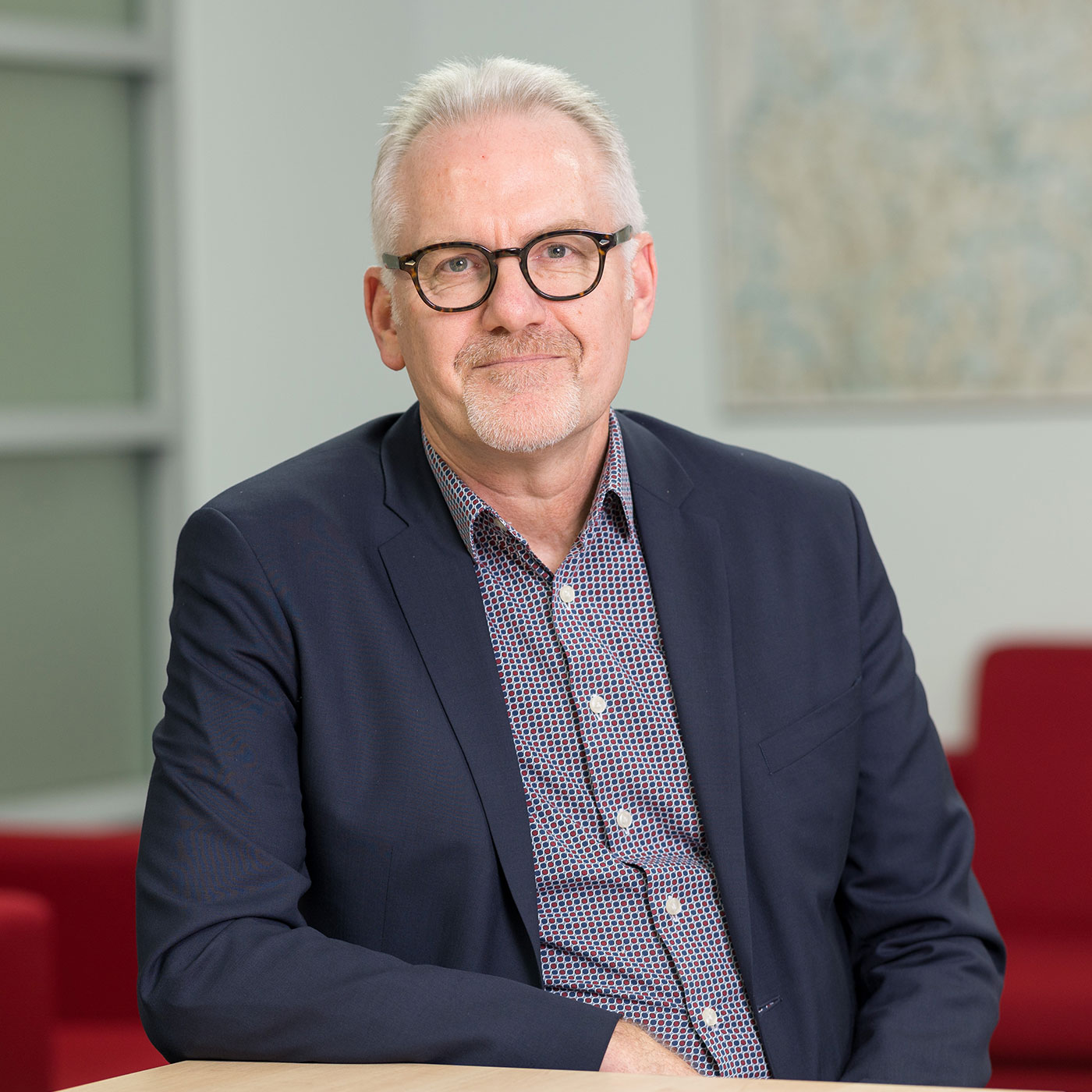Distinguished career with a global focus
The University's highest honour, the Distinguished Research Medal, has been awarded to Professor David Murdoch whose career-long commitment to fighting infectious diseases was cemented during his time as a newly-trained doctor working in Nepal.
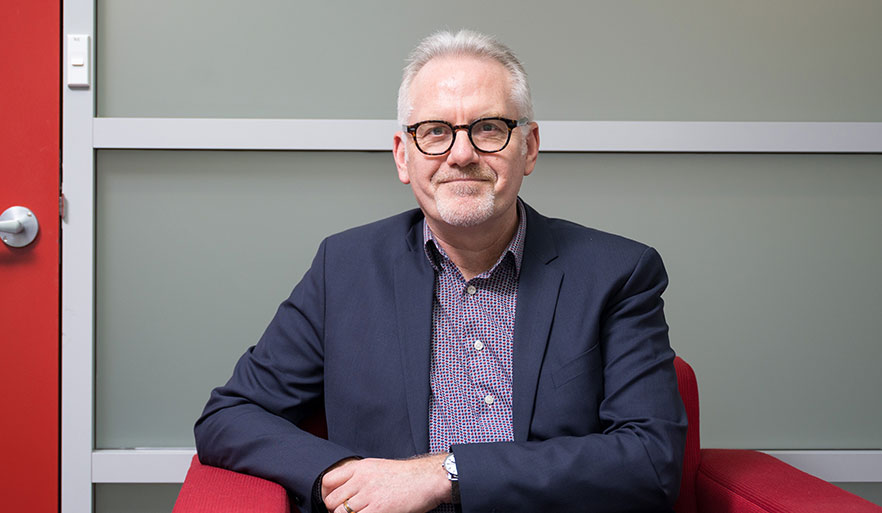
Professor David Murdoch: “Since I was quite young, I had always been concerned about global and social injustices.”
As a boy, David Murdoch would spend hours poring over his father's old Bartholomew Atlas. Mountains – the Himalaya in particular – held a fascination.
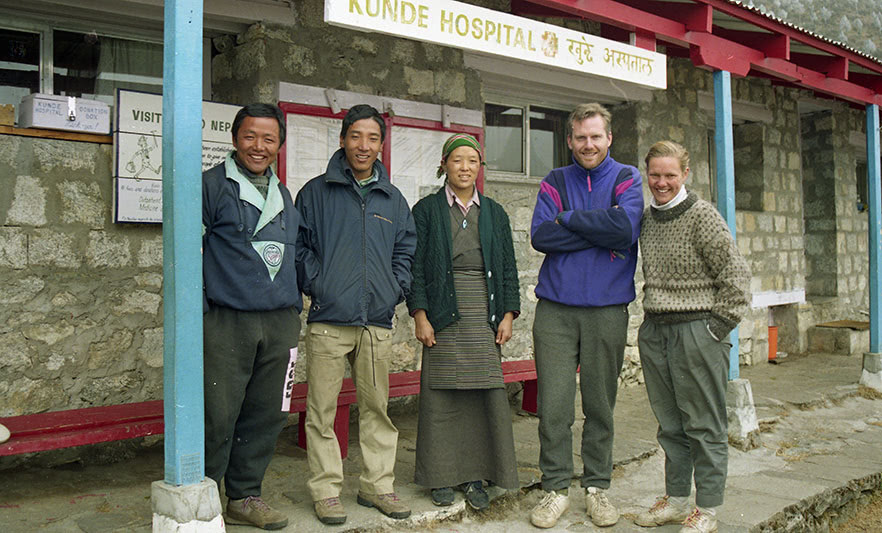
David Murdoch and Lynley Cook outside Kunde Hospital with hospital staff (from left) Kami Temba, Mingma Temba and Tsumji.
As it happened, the Himalaya would play a pivotal role in the career of this year's Distinguished Research Medal recipient. Stints volunteering at remote Nepalese hospitals influenced him to become an infectious disease specialist and researcher.
Today Murdoch is a professor and recognised world leader in the study, prevention and treatment of infectious diseases. Among his many achievements is a leading role in a global childhood pneumonia study that altered the course of this disease – the world's single biggest killer of young children. He is currently one of three independent advisors consulting the Oxford University team developing a vaccine for COVID-19.
“Looking back, it's quite extraordinary some of the things we were involved in during that short period of time, and it's no exaggeration that it shaped our lives and our careers.”
Murdoch first experienced global health issues on his medical school elective at a hospital in Kathmandu, Nepal, with his now-wife, Lynley Cook. They subsequently travelled the country and fell in love with the place and its people.
“I found myself totally immersed in the mountains and the mix of different religions. It was exhilarating and challenging. Totally magic.”
As a newly-trained doctor, he and Lynley worked at a high-altitude aid post in the Mount Everest region, followed by two years with Cook at nearby Kunde Hospital, for Sir Edmund Hillary's Himalayan Trust.
“As we left New Zealand for Nepal we felt incredible happiness knowing we were going for two years to this amazing place. Many times during our stay I stood outside the hospital with the most magnificent mountain vista in front of us and thought 'this is probably the best job I will ever have and we're not even being paid!'"
In Nepal, Murdoch developed invaluable and lasting connections with local health professionals, and an understanding of medical problems facing the country and other developing nations. It also exposed him to the devastating effects of infectious diseases and cemented his decision to specialise in the area.
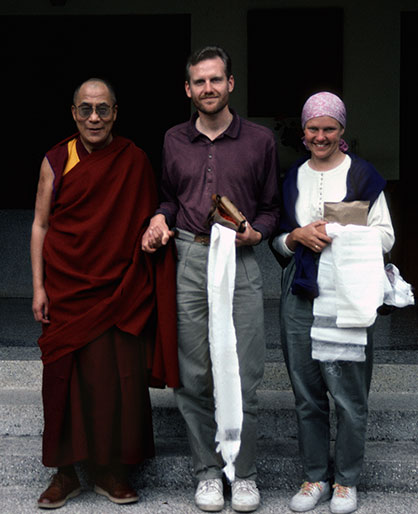
David and Lynley with the Dalai Lama.
“Since I was quite young, I had always been concerned about global and social injustices. Infectious diseases had been brewing as an option as I studied medicine, but going to Nepal and having to deal with so much preventable disease sealed it for me.
“There was a massive measles outbreak while we were in Kunde and kids were dying. It was horrific. We saw cases of tuberculosis, typhoid, leprosy and iodine deficiency. We were part of national treatment programmes and witnessed the transformative nature of public health programmes.
“We hid and treated Tibetan refugees fleeing over the mountains, which led to meeting the Dalai Lama. Looking back, it's quite extraordinary some of the things we were involved in during that short period of time, and it's no exaggeration that it shaped our lives and our careers.”
Murdoch followed his undergraduate medical training with a diploma at the Liverpool School of Tropical Medicine and later completed a fellowship at Duke University in North Carolina and a master's degree in epidemiology at the London School of Hygiene and Tropical Medicine. It was in the United States that his love of Nepal and his interest in global infectious disease research would merge.
“My boss at Duke, Barth Reller, was interested in international work. He knew about my relationship with Nepal and encouraged me to explore research opportunities there. Barth said if I came up with a worthwhile project, he would sort the funding,” Murdoch recounts.
The result was a simple, but much-needed, study done with staff at Kathmandu's Patan Hospital to identify which infections were hospitalising patients.
“I spoke to a physician friend at Patan Hospital. At the time there was a huge burden of infectious disease in Nepal, but not a lot of information about which infections were causing most harm. It was one of many studies that cemented my view that the best research outcomes come about through friendship, respect and true collaboration."
After finishing his fellowship at Duke University in 2000, Murdoch returned home and shortly afterwards became head of the Pathology Department at the University of Otago, Christchurch, where he began a number of studies on pneumonia and Legionnaires' disease with fellow clinician and veteran researcher Professor Steve Chambers and colleagues at Canterbury Health Laboratories.
Their work on Legionnaires' disease would reveal the often overlooked but deadly disease was four times more prevalent in Canterbury than expected. This ground-breaking work led to the establishment of the world's first national surveillance study of Legionnaires' disease showing that New Zealand had the highest reported incidence globally.
At the same time, Murdoch's reputation as a notable international researcher was growing. He was asked by colleagues at Patan Hospital to help establish a research programme on serious infections affecting Nepalese children, particularly vaccine-preventable ones.
He enlisted the help of an old friend, British paediatrician Professor Andy Pollard. The pair met while planning a Mount Everest expedition in the 1990s while Murdoch was in Liverpool and “rapidly became close friends, with a shared world view and work ethic and love of mountains and Nepal”. They co-wrote The High Altitude Medicine Handbook, a practical guidebook that went to three editions plus a pirated version, and is still considered one of the best clinical reference books of its kind.
“Andy and I still hear stories about how this book has saved lives in the mountains.” Pollard is now one of the world's leading vaccine experts and is the lead researcher on the Oxford University programme to develop a COVID-19 vaccine.
“The programme of work we established in Nepal identified the important causes of pneumonia and meningitis in children and the suitability of vaccine schedules. It directly led to major policy decisions in the country, including the introduction by the Nepalese government of Haemophilus influenzae type b and pneumococcal vaccines into their national immunisation programme in 2009 and 2015, respectively. This work is an absolute career highlight for me and a source of immense pride. It has had a substantial impact on child health in Nepal and helped established a new generation of young Nepali researchers.”
Through this programme, Murdoch and his collaborators developed strong relationships with the Ministry of Health in Nepal, the World Health Organization's local office and Global Alliance of Vaccine and Immunisation (GAVI), which provides a mechanism for the funding of vaccines in poor countries.
“All those years ago in Nepal I saw how devastating infectious diseases can be. They don't respect international borders and… a pandemic was always going to be inevitable, as is another one in the future. My hope is this experience will open our eyes and we can work better together as a global community in future.”
His expertise in pneumonia research, and ability to develop close working relationships with international collaborators, led to an invitation to join the largest ever study of childhood pneumonia funded by the Bill and Melinda Gates foundation.
One of Murdoch's tasks was to set up laboratories for the Pneumonia Etiology Research for Child Health (PERCH) study in seven countries in Asia and Africa. Over a two-year study period the laboratories ran tests on children hospitalised with severe pneumonia to pinpoint the specific viruses and bacteria involved. In 2019 the PERCH team published a significant paper summarising its work. It identified a major viral contributor to the hospitalisation and death of millions of children that could be vaccinated against.
Murdoch says the PERCH study gave countries, the World Health Organization and major funders direction on where to put limited resources for pneumonia prevention such as vaccination programmes.
While working on the PERCH initiative, Murdoch established an important New Zealand group. He and veterinarian Professor Nigel French, of Massey University, co-founded One Health Aotearoa. It began as a partnership between the medical school, veterinary school and the Institute of Environmental Science and Research (ESR). At its core is the philosophy that human health and infection is impacted by animal health and changes in our environment.
Murdoch says the COVID-19 pandemic is proof of this crucial interplay. He believes New Zealand needs to adopt the One Health approach to strengthen its defences against COVID-19 and inevitable future infectious disease threats.
“Like many countries, we are not always well 'joined up' – which is vital for a co-ordinated and timely response. We allow scientists to work in silos, despite obvious overlapping interests and skill-sets,'' he says.
“We need to strengthen capability in areas such as epidemiology, modelling and outbreak management, and build generic pandemic plans that are flexible enough to respond to all eventualities.”
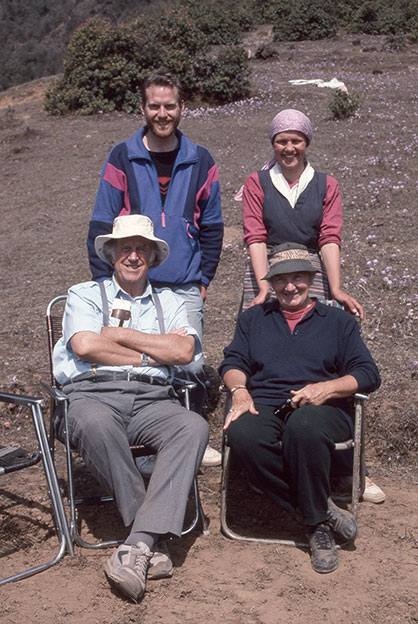
And with Sir Edmund Hillary and his wife June.
A lack of investment in infectious diseases research also needs to be addressed, he argues.
“New Zealand has a Centre of Research Excellence in plant biosecurity, but not in animal biosecurity or infectious diseases. We need to better integrate science and research into the health system. This requires a culture change and investment so research is regarded as business-as-usual for district health boards, providing the science needed to inform policy, preparedness and best practice.”
Murdoch says the pandemic has brought the importance of scientific collaboration and global health into focus.
“All those years ago in Nepal I saw how devastating infectious diseases can be. They don't respect international borders and, in this age of regular global travel and humans' impact on the environment, a pandemic was always going to be inevitable, as is another one in the future. My hope is this experience will open our eyes and we can work better together as a global community in future.”
KIM THOMAS

